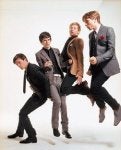Anthony,
That's interesting. My first hand knowledge comes from a school in Alberta. That school actually had a very strict dress code. Most students wore jeans and had one or two pair, meaning novelty clothing wasn't an option. It was partially tuition, and partially the fact that many of the students came from families who were agricultural and didn't really have a reason to own bright trousers or clothing you couldn't clean the pig sty with. I am the son of a factory owner, and I will also admit, was a bit monied, but Dad didn't let me buy anything that wouldn't fit in.
I remember coming back from an overnight outing at a Christian Bible camp. Somehow a pair of somebody else's jeans had got packed away with my kit. I naturally refused to open my kit even when a teacher came over and ordered me to. I wasn't about to air my dirty laundry, especially not in public.
The boy explained to me that it was an accident, but aside from the shorts he was wearing, he didn't own any pants other than those jeans and his Church clothing. Imagine that, a boy with only one pair casual pants!
At least in my experience jeans and a button-up shirt tended to be fairly standard, with black chinos and a white dress shirt for band concerts, picture day and special events.
Once I got into government school, the aspiring prepsters tended to wear RL Polo, GAP, Tommy Jeans and Calvin Klein. It was bright colours and guys would buy five identical pair of trousers just to maintain uniformity. I never actually wore most of that stuff, but they counted me among their number, because I would wear ties, sweaters and button-downs.
In university, it was mainly the hipster crowd that wore bright clothing. For my friends and I it was GAP khakis, a white OCBD or spread collar, a necktie or bow tie and Rockport shoes. If it was possible, we'd wear jackets, but it wasn't part of our unofficial dress code. University is that time when people can retire their old habits and be as bohemian as they choose. My friends were far from bohemians, but our clothing was also sedate, and we stood out not by force of colour, but by character and motivation.





